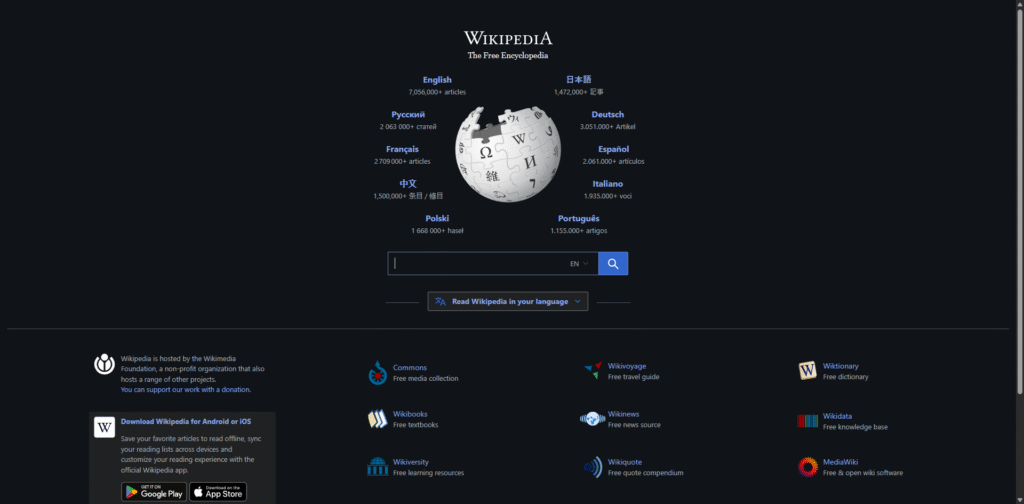Wikipedia is not a source you should cite in a paper—but yes as a smart starting point to understand a topic and to mine high-quality references. That’s the academically safe truth you came for. While Wikipedia articles are easy to access and cover an incredible range of subjects, their open-editing model means that anyone can contribute, which can sometimes introduce inaccuracies or bias. However, this does not diminish its usefulness as a research tool when approached thoughtfully.
Used correctly, Wikipedia can serve as a launchpad for deeper academic exploration. Its references and citations often point to peer-reviewed journals, books, and authoritative sources that are perfectly suitable for academic work. By examining these primary and secondary sources, students and researchers can build a strong foundation for their projects while avoiding the pitfalls of citing Wikipedia itself. This balance is crucial when answering the question: Is Wikipedia a Reliable Source for Academic Research?
The Question: Is Wikipedia a Reliable Source for Academic Research?
Imagine you’re cranking out a paper at 11:47 p.m. You need facts—fast. Where do you go first? For most of us, it’s Wikipedia. With millions of articles covering everything from quantum physics to pop culture, and near-instant updates on breaking events, it has become the world’s default reference desk. Its convenience and breadth make it tempting to rely on, especially when deadlines loom. But when it comes to academic work, the reality is more complicated. So, is Wikipedia a reliable source for academic research? The answer lies in how you use it: Wikipedia is incredibly useful for getting an overview of a subject, identifying key concepts, and even discovering terminology you can use to search for more credible sources.

The catch is that Wikipedia is not considered a citable authority in academic writing. Its open-editing model allows anyone to contribute, which means that information can change rapidly and occasionally be inaccurate. Even Wikipedia’s founder, Jimmy Wales, has emphasised that encyclopedias—including Wikipedia—should not be cited in scholarly papers. The safest approach is to use Wikipedia as a guide to find trustworthy primary and secondary sources. By following citations within Wikipedia articles, students and researchers can access peer-reviewed journals, books, and other reliable materials, making it a smart stepping stone rather than the destination itself. Understanding this distinction helps students approach research strategically and avoid common pitfalls.
The Power and Pitfalls of Crowdsourced Knowledge
Wikipedia’s Strengths: A Vast Encyclopedia
- Accessibility: It’s free and available everywhere.
- Breadth: It covers almost anything you can think of—from randomized trials to Renaissance art.
- Up-to-date information: Wikipedia can reflect breaking news within minutes. When Queen Elizabeth II died (announced 17:31 UTC on 8 Sept 2022), editors updated her page within about a minute.
- Quality can be competitive in some domains: A classic study in Nature found Wikipedia’s science entries “come close to Britannica” in accuracy (a result Britannica later disputed—useful context in itself).
Wikipedia’s Weaknesses: The Open Editing Model
- Vandalism: Anyone can edit, so bad edits happen (though many get reverted quickly).
- Bias: Editors are human; controversial topics can tilt or seesaw as debates unfold.
- Inaccuracy/instability: Content changes over time and isn’t expert-reviewed the way journals are.
- How common are “warning” flags? Wikipedia’s own maintenance tracking shows ~557,000 English articles contain at least one “needs verification/‘citation needed’” tag. With ~7.06 million English articles (Sept 2025), that’s about 8% of articles carrying a reliability warning.
- Expert perspective: Historian Roy Rosenzweig summarized a core challenge of open platforms: “Writing about Wikipedia is maddeningly difficult. Because Wikipedia is subject to constant change, much that I write about Wikipedia could be untrue by the time you read this.”
How Academics View Wikipedia
Academic Standards and Wikipedia
Primary vs. secondary sources (quickly):
- Primary: Original materials or firsthand evidence, such as datasets, experiments, diaries, interviews, or historical documents. These sources provide the raw information scholars analyse directly.
- Secondary: Interpretations, analyses, or evaluations of primary sources, such as scholarly articles, academic books, or critical essays. These sources offer context, discussion, and synthesis of primary material.
- Wikipedia: Considered a tertiary source—it summarises secondary sources, condenses complex information, and often links to the original research. Its value lies in providing an overview, organising information, and pointing readers toward more authoritative sources.
Starting point: Many instructors and research guides endorse Wikipedia for orientation, not citation. For instance, Harvard’s library guide suggests starting with Wikipedia to grasp the basics of a topic but emphasises the importance of following its citations to the original, citable sources. Using Wikipedia in this way ensures that you understand the subject before engaging with scholarly material.
The “Wikipedia Rule”: Plenty of professors forbid citing it directly, just as they would any other encyclopedia. Even Wikipedia’s founder, Jimmy Wales, has advised students against citing Wikipedia or Britannica in academic papers. The reasoning is straightforward: encyclopedias are prone to change, may lack peer review, and are written to summarise existing research rather than contribute new knowledge.
Example in practice: Suppose your assignment is to locate peer-reviewed articles on climate change. Wikipedia can help you quickly learn key concepts, terminology, and historical context. From there, you can pivot to library databases, JSTOR, or Google Scholar to locate citable, authoritative sources.
Expert Opinions on Its Use
- Professor perspectives: Many instructors stress that Wikipedia is useful for getting oriented on a topic but should not be cited. They emphasise its role as a stepping stone toward deeper research rather than as an endpoint.
- Librarian advice: Academic librarians consistently frame Wikipedia as a gateway. Library guides often encourage students to trace Wikipedia citations to primary and secondary sources, teaching research skills while leveraging Wikipedia’s accessibility.
- A historian’s view: Roy Rosenzweig, in his widely taught essay, highlights Wikipedia’s breadth and speed but cautions about the trade-offs inherent in open editing. He notes that while Wikipedia is excellent for initial exploration, its lack of formal peer review limits its reliability for scholarly work.
- Additional expert insight: Some scholars argue that Wikipedia can reflect current academic consensus in certain scientific or historical topics, but caution that controversial or rapidly evolving subjects may contain biased or incomplete information.
Extra points to consider:
- Transparency: Wikipedia articles show edit histories and talk pages, which can help students evaluate how information is constructed and contested.
- Collaborative value: Its open-editing model allows experts and enthusiasts alike to contribute, but the quality varies significantly across entries.
- Citing with care: Some educators allow citing Wikipedia only when the focus is on Wikipedia itself (e.g., digital literacy studies) rather than the content it summarises.
Evaluating Wikipedia Entries for Research
Red Flags (use caution or avoid)
- No or weak citations: Claims without inline references or with broken/outdated links.
- Poor prose/low quality: Sloppy grammar, unclear structure.
- Heated/controversial topics: Look for debate on the Talk page; be extra careful.
- Maintenance tags: “Citation needed,” “Neutrality disputed,” “Unreferenced,” etc. (Remember: ~8% of articles have “needs verification” tags.)
Green Flags (use as a springboard)
- Well-cited articles: Dense reference lists populated with scholarly books, peer-reviewed journals, major news orgs, and authoritative reports.
- Clear scope & structure: A crisp lead, logical headings, and stable history.
- Strong bibliographies: “Further reading” and “External links” sections that point to citable sources.
Case study (good sourcing in the wild):
The Apollo 11 article anchors its narrative in NASA documents, mission logs, and reputable news outlets—exactly what you want when tracking down citable material for a paper. Use the inline citations and reference list as a roadmap to primary/secondary sources.
Beyond Wikipedia: Building a Strong Research Foundation
Why Scholarly Sources Matter
- Peer review: Scholarly sources go through rigorous evaluation by experts in the field. Reviewers assess the methodology, evidence, and reasoning before publication, ensuring that the findings are credible and the analysis is sound. This process is the gold standard for academic reliability, giving students confidence that the material they cite has been vetted by professionals. In contrast, Wikipedia entries do not undergo formal peer review, which is why they cannot be treated as citable academic sources.
- Volume of research: The body of scholarly literature is vast and continuously growing. For example, databases like Dimensions reported around 4.7 million articles published in 2020 alone, while other sources consistently cite over 3 million peer-reviewed articles annually. This enormous volume means that for nearly any research topic, there is a wealth of authoritative material to draw from—far more detailed and reliable than a single Wikipedia page can offer.
- Depth and nuance: Scholarly sources often provide extensive context, theoretical frameworks, and nuanced discussion that Wikipedia cannot match. Academic books, journal articles, and conference papers allow researchers to explore complex issues in detail, critically evaluate competing perspectives, and build well-supported arguments in their work.
- Citations and reproducibility: Reliable academic sources include citations, data, and methodologies that allow others to verify and replicate findings. This transparency strengthens your research and ensures that your arguments rest on a solid foundation. Wikipedia can point to some of these sources, but it does not provide the reproducibility and accountability that academic writing demands.
- Author credibility: Academic publications identify authors’ affiliations, expertise, and sometimes funding sources, helping readers assess potential bias or reliability. Wikipedia contributors are often anonymous or have varying levels of expertise, which makes it harder to gauge the authority of the information.
By prioritising peer-reviewed journals, academic books, and reputable databases, students can move beyond Wikipedia as a starting point and build a robust research foundation. Using Wikipedia as an orientation tool is fine, but truly strong research relies on sources that have undergone rigorous scrutiny and contribute new knowledge to the field.
Actionable Steps for Reliable Research
- Start with Wikipedia—for orientation only. Skim the lead, note key terms and names.
- Follow the citations. Click through to the original sources; evaluate them yourself.
- Use library databases and catalogs. (Ask your librarian—they love this stuff.)
- Ask your professor/librarian. Clarify what counts as acceptable sources for your assignment.
- Key tools to bookmark:
- Google Scholar (broad scholarly search)
- Your university library portal & subject databases (e.g., JSTOR, Project MUSE, ProQuest, EBSCO, IEEE Xplore)
- Discipline hubs: PubMed (biomed), SSRN (social sciences), arXiv (math/CS/physics), ERIC (education)
Conclusion: Wikipedia’s Place in the Academic Toolkit
- Bottom line: Wikipedia has enormous value—for orientation, quick context, and finding credible sources—but it isn’t a final authority to cite in academic work.
- Best use: Treat it as a stepping stone—then move to peer-reviewed journals, scholarly books, and authoritative reports.
- Final takeaway: Academic integrity means relying on credible, verifiable, and stable sources. Use Wikipedia to get smart fast, and use scholarly sources to write with authority.
Once you’ve mastered identifying reliable sources on Wikipedia, it’s equally important to learn how to spot unreliable academic outlets—check out our guide on “What are Predatory Journals: A 2025 Guide to Avoiding Them” to stay ahead in your research.


